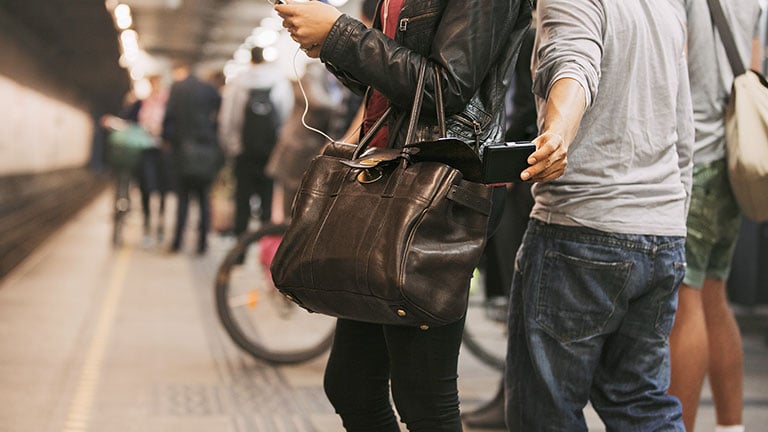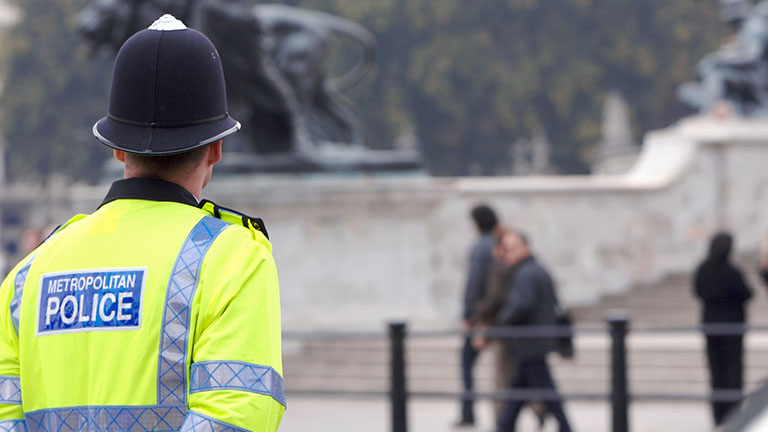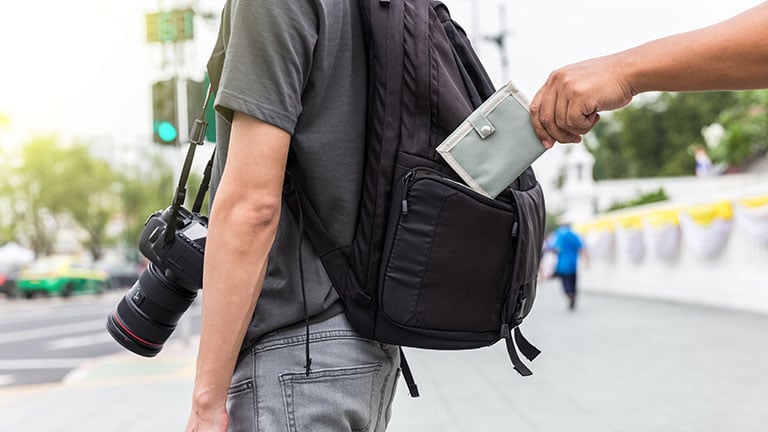
Having your wallet, bag, or phone stolen while traveling can derail your vacation in an instant. While pickpocketing can be a risk anywhere in the world, you can reduce the chances of it happening to you—and be prepared in the event that it does. Here’s how.

Stay alert in high-risk areas
Pickpockets not only target tourist attractions and public spaces that attract visitors, but they also linger around transportation hubs, looking for those who seem unfamiliar with local trains, buses, or subways.
“Know where you're going,” advises Adam Rapp, owner and designer at Clothing Arts, a clothing company known for its Pick-Pocket Proof apparel. “Keep an eye out for anyone who may be taking too much interest in you being in the area.”

Protect yourself on public transport
Train and bus routes, especially those stopping at popular attractions, are often targeted by pickpockets. If a train is packed, thieves may press up against you and your bag. Keep your belongings close to your side.

Don’t dress flashy
It’s easy to show your favorite American sports team hat or put on your best watch or earrings when traveling, but these accessories might make you a potential target. Instead, leave sparkly jewelry or other trendy items at home, and opt for more neutral colored and relaxed clothing instead.
“You’ve just got to remember when you travel overseas that you stick out,” says travel expert, author and TV host Rick Steves. “You don’t want anything [that would] call attention to you.”
It’s best to leave important items secured in your hotel room or in your hotel room’s built-in safe.
“I always feel that a hotel room is much, much safer than it is anything is with you on the streets,” adds Steves.

Don’t fall for distractions
Petty theft often involves people using various techniques that attempt to grab your attention—and your stuff. For example, one person may distract you while another quickly swipes your belongings.
Other tactics may entail strangers initiating overly friendly interactions or asking for your support with a cause or personal situation, so it’s important to be polite yet firm in setting your boundaries.
“You should remember there's a lot of con artists on the street that talk their way into your life,” says Steves. “I'm sad to say it, but you have to be skeptical of that kind of extreme friendliness.”

Watch your phone
Smartphones can be a hot target as they can have not only resalue value but also their owners’ personal information, leading to identity theft and scams.
Stay current on system updates to your phone, and apply complicated passwords and two-factor authentication for added protection. Also, don’t leave your phone on an open table to avoid a snatch and grab, and memorize your walking directions before heading out so that you can be aware of your surroundings and not focused solely on your phone.

Use a money belt
Steves recommends wearing an antitheft waist pack underneath your clothing to store banknotes, debit cards, and credit cards. Antitheft crossbody bags are also good options.

Position your bag wisely
It’s easy to sling your bag or purse on the back of your chair at a restaurant, making it vulnerable to theft. Instead, keep your bag in front or against you.
“Also, if you are carrying a big/expensive camera, swap out the branded camera strap with a generic black one that doesn't broadcast how expensive your camera is from a distance,” says Rapp.
Consider travel insurance
Depending upon the policy, travel insurance may cover some losses due to theft. “If your plan includes baggage benefits, you may be reimbursed for items stolen on your trip up to the maximum benefit listed in your plan,” says Daniel Durazo of travel insurance provider Allianz Travel.

Get help from local authorities
If theft does occur, report it at the nearest police station, and get a paper copy of a police report. This paperwork can also aid in replacing stolen legal documents such as bank or credit cards or your personal identification.
If you’re put in a dangerous situation, it’s best to let your item go rather than risk life and limb.
If you’ve been injured in a theft attempt, seek medical attention immediately.
…..
With these tips, you can explore the world confidently knowing that you and your belongings are more secure. Prevention is often the key to protecting yourself from picketpocketing.

